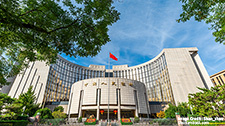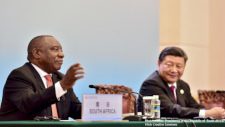China’s Approach to the Women, Peace and Security (WPS) Agenda: An Interview with YEONJU JUNG

Clara Stäbler and Tove Jalmerud
In the current landscape of global politics, China’s rise and its foreign policy are frequent topics of discussion. Simultaneously, there’s a growing interest in studying gender and women’s issues within the Chinese context. Surprisingly, the intersections of these two areas have been largely overlooked. To explore this knowledge gap, Clara Stäbler and Tove Jalmerud, interns of the Asia Program and the Stockholm China Center at ISDP, sat down with Yeonju Jung, a PhD scholar researching this often overlooked juncture in international politics. They discuss various aspects of China’s approach to the Women, Peace, and Security (WPS) agenda in the international arena.
Yeonju Jung is a PhD Candidate in International Relations at Stockholm University and an Associate Fellow in the Asia Program, at the Swedish Institute of Foreign Affairs, mainly researching gender in security and development with a focus on East Asia. Her PhD examines China’s engagements in conflict-affected countries and its approach to peacebuilding from a gender perspective. Jung has previously worked for the Stockholm International Peace Research Institute (SIPRI), and she holds a master’s degree in Social Anthropology of Development from SOAS, University of London.
Related Publications
-
Safeguarding intellectual property in the wake of digital authoritarianism: An Interview with DR. REBECCA SPYKE KEISER
Dr. Rebecca Spyke Keiser is the Chief of Research Security Strategy and Policy (CRSSP) at the National Science Foundation (NSF). The U.S. National Science Foundation is an independent federal agency […]
-
The Economic Leash: China’s Financial Tethers and Global Power Plays
China’s emphasis on Gross Domestic Product (GDP) growth and its integration into global markets have allowed it to wield significant influence internationally. Nonetheless, this focus on rapid expansion has created […]
-
China’s Security Engagement with Africa & The “Global South” Narrative
In recent decades, China has actively sought to position itself as a pivotal partner and emerging leader within the Global South. Despite the lack of clear consensus on the definition […]
-
The US and EU, and the Emerging Supply Chain Network: Politics, Prospects, and Allies
The Global Supply Chains have evolved from simply logistical achievements to being the bedrock of the global economy. Driven by technological advances and geopolitical shifts, this transformation underscores the critical […]
-
ISDP Annual Report 2023
ISDP’s Annual Report for the year 2023. We look back on 2023, a year in which tensions and conflicts captured the strategic space in ISDP’s focus areas, making headlines around […]




